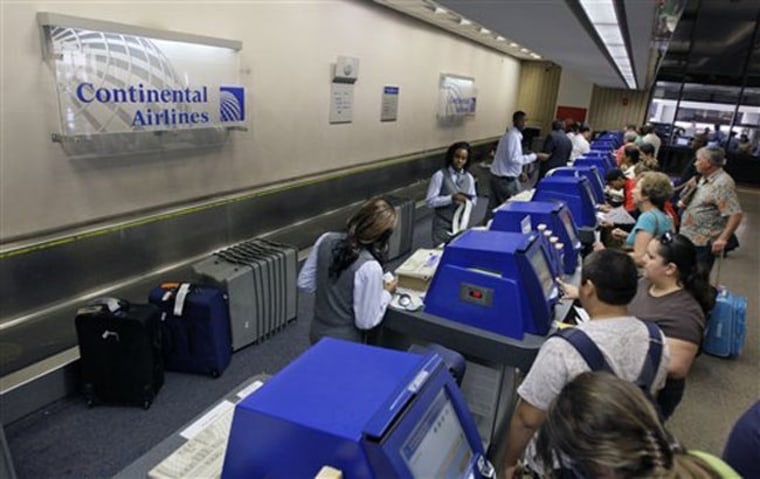We’ve all heard the horror stories about well-intended watchlists designed to keep terrorists from boarding airplanes: How Senator Ted Kennedy’s name showed up on a watchlist a few years ago; how young children with names similar to those of known terrorists are prevented from boarding; how even federal air marshals have been barred from taking flights they are assigned to protect.
What these almost-comical applications of deadly serious procedures have in common is false-positives: Innocent people are flagged as terrorists — wrongly and sometimes repeatedly — because the federal government’s watchlists are so bloated and misidentification is common. According to Homeland Security Secretary Michael Chertoff, one major U.S. airline records 9,000 false-positives a day just by itself.
Now, nearly seven years after the Sept. 11, 2001 terrorist attacks on the United States with hijacked airliners, it may finally be getting easier for innocent travelers to get their names removed from the watchlists. Easier … but not easy, as reform is far from complete and far from transparent.
Following years of consumer complaints, Freedom of Information Act requests and lawsuits, the Transportation Security Administration (TSA) — a branch of the Department of Homeland Security — launched a program in February 2007 called Traveler Redress Inquiry Program (TRIP).
TRIP provides a means of appeal for people who feel they have been wrongly included on the TSA’s “selectee" list, which subjects travelers to additional airport security screening and delays boarding, or the more-serious “no-fly" list, which bars flying altogether. Recent media reports have put the total number of names on these two lists as high as 900,000.
TRIP may be ineffective
As of January 2008, some 24,000 people had used TRIP to appeal their inclusion on the lists. The TSA hasn’t revealed how many applicants have been officially cleared or whether clearance has actually resulted in no-hassle flying. Anecdotal reports from frequent fliers maintain that many travelers who were told they were cleared continue to be stopped in airports.
The TSA press office in Washington, D.C. declined to take questions about TRIP from an Aviation.com writer, referring the writer to TSA spokesman Nico Melendez in Southern California. Melendez didn’t return the reporter’s telephone call or reply by e-mail for this story.
In past years, TSA spokespeople suggested that aggrieved travelers contact the TSA ombudsman to set things right, but TRIP has largely superseded the earlier procedure. Perhaps that’s for the best, as the TSA ombudsman’s office has received scathingly bad reviews from TSA employees, as related by a report made public in late June by the Inspector General of the Department of Homeland Security. Complaining of poor training and tone-deaf management, some 20 percent of TSA screeners quit their jobs last year.
As it stands, TRIP consists mainly of an online form. Travelers who want to tap into TRIP should go to the TSA’s Web site, look for the "Resource Center" section on the right-hand side of the page and follow the prompts.
TRIP requires users to submit detailed and voluminous personal information to the TSA by filling out the online form, or by fax, e-mail or snail-mail. Typically, driver’s licenses, Social Security number, date of birth, passport or “green card" residency and other relevant information is required, so that the TSA can establish that the applicant is who he says he is and is not a terrorist.
Early this year, TSA spokespeople said an appeal through TRIP takes about 40 days to process, down from 44 days last year. The progress of an appeal can be tracked online by the applicant by using an assigned case number.
Congressional action
Consumer dissatisfaction with TRIP has prompted Congress to take additional steps on air travelers’ behalf which may eventually cut red tape and reduce the number of false-positives at airports.
On June 18, the House of Representatives passed a bill called the Fair, Accurate, Secure and Timely Redress Act (FAST-Redress), which will, if it becomes law, establish a new, independent federal office to process travelers’ complaints and an updated, streamlined passenger watchlist. If and when these measures will become law is unknown. The Senate must pass similar legislation, then the House and Senate versions must be rectified in joint committee, then the President has to sign the bill.
By the time the seventh anniversary of the Sept. 11 attacks arrives this year, there may still be no consistent, coherent way to fight frustrating false-positives and pry the names of innocent travelers off Washington’s watchlists.
Absent sweeping reform, fliers could book their flights using their full legal names; sometimes just supplying additional detailed information to an airline can help a carrier separate innocent travelers from terrorists with the same or similar names. Or you can try your luck with TRIP.
It may also be time to get politically active, by urging the Senate to pass watchlist reform legislation and bringing watchlist concerns to the attention of Barrack Obama’s and John McCain’s campaigns.
